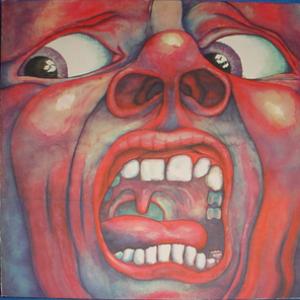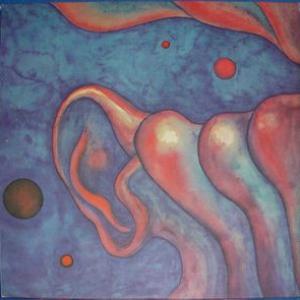Strawberry Bricks Entry:
The painstakingly documented history of King Crimson begins with their birth on January 13th, 1969 in the basement of the Fulham Palace Café, London. The trio of Giles, Giles & Fripp had expanded a year earlier with the arrival of Ian McDonald. Lyricist Peter Sinfield, McDonald's songwriting partner, became the band's fifth member; this included the duties of road manager, light artist, resident hippie, etc. Yet at Robert Fripp's persistence, fellow Bournemouth guitarist Greg Lake joined on bass and vocals, replacing Peter Giles; Lake had previously been in The Gods. The recording of their debut album was twice abandoned (once with The Moody Blues' producer Tony Clark), but a third self-produced effort, with E.G. Management's David Enthoven and John Gaydon footing the bill, proved successful. The power of the band is immediately apparent as "21st Century Schizoid Man" blasts away: King Crimson resounds like nothing before it. Propelled by Michael Giles's inventive drumming, the band's interplay is precise, and their sound is simultaneously immense yet detailed; Fripp's screeching guitar solo is positively terrifying. The Mellotron figures prominently, dominating both "Epitaph" and the title track. This was no mere accessory; rather, the band were writing specifically for the instrument. It's an important point as the technology of the era was instrumental in defining the genre of progressive rock. The album's gentler moments, "I Talk to the Wind" and "Moonchild," showcase McDonald's ability as a composer and Fripp's grace (and considerable jazz influence) as a guitarist, especially in the latter's improvised half. Here the band is both mature and meticulous. Throughout the album, King Crimson display their talents. Listening to the flute solo in the title track, it's obvious that McDonald is an accomplished soloist; yet that he's showing us he can play is central to the progressive aesthetic as well: There is no hiding his virtuosity or creativity; in fact, he's flaunting it. Even Sinfield's words, sympathetic to Lake's voice, soar, though it's a matter of taste as to whether they "crack at the seam." In The Court Of The Crimson King sets a new standard for rock music, on what Pete Townshend called an "uncanny masterpiece." The cover art, a harrowing face painted by Barry Godber, also would set the album apart. King Crimson's timely supporting slot at The Rolling Stones' free concert in London's Hyde Park in July was most fortunate. Consequently, the album-arguably the first prog rock record-awaited a flurry of interest; it peaked at No. 5 in the UK, while in the US it broke into the Top 30. King Crimson ended their first year with a two-month tour of the US.



